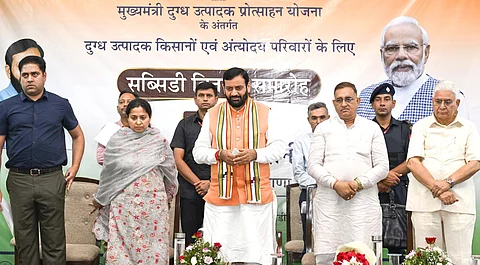

The Haryana government has taken steps to woo farmers even as the state goes to the polls on October 1, 2024, to elect a new legislature.
On August 16, just before the Election Commission announced the voting date, Haryana Chief Minister Nayab Singh Saini held a press conference and said Rs 525 crore had been credited into the accounts of 520,000 farmers of the state.
This payment has been made to farmers as a bonus of Rs 2,000 per acre. The chief minister said the money will reach the farmers in one to two days.
Haryana’s farmers had to initially face drought in the current Kharif season.
The chief minister noted in the press conference that only 87 mm of rain had fallen from June 4 to July 29 this year. Farmers thus had to spend more on tube wells and other resources.
Due to this, the input cost of the crop had increased.
Pest infestation due to climatic conditions had led to diseases. Farmers had to incur higher input costs to protect their crops from the pests and diseases.
Keeping all this in mind, the government had decided to give bonus to Haryana’s farmers, according to Saini.
The bonus is to be given only for Kharif and horticulture crops. Small farmers, who have less than an acre of land, will also be given a bonus of Rs 2,000.
A more plausible reason for the bonus could be Saini’s Bharatiya Janata Party facing defeat in five Haryana seats during the Lok Sabha elections, the results of which were declared on June 4.
Most of these seats were rural and the reason for the defeat was believed to be farmer resentment.
The Saini government decided to purchase all crops at Minimum Support Price (MSP) a few days ago.
Ten crops — ragi (finger millet), soybean, kalatil (nigerseed), safflower, barley, maize, jowar (sorghum), jute, copra (dry coconut) and moong (green gram) — have been added to the list of 14 crops already being purchased at MSP in the state.
It was also claimed in a statement that Haryana is the first state in the country to launch the ‘Mukhyamantri Horticulture Insurance Scheme’ to protect horticulture crops from the vagaries of weather. Financial assistance of Rs 30,000 is being given to livestock-owning farmers to promote natural farming.
The cabinet has also waived off arrears of over Rs 133 crore related to the irrigation cess that had been due on farmers since the colonial era.
The chief minister also made many big announcements for arhtiyas, traditional middlemen who facilitate transactions between farmers and buyers in mandis (wholesale markets).
The government announced an increase in paddy prices from Rs 45.88 to Rs 55.00 per quintal. Apart from this, the government will compensate the loss incurred by the commission agents due to shortage in wheat. Saini announced a compensation of about Rs 12 crore for this.
Earlier on August 15, Saini said that under the Chief Minister Milk Producer Promotion Scheme, a subsidy of Rs 15 crore 59 lakh was issued to 35,000 milk producers for April, May and June 2024.
The chief minister also announced that under the Pradhan Mantri Bima Yojana, the state government will bear the insurance premium of those supplying milk to homes in Haryana.
Farmers of the state are also angry about the damage being caused to their crops by stray animals. This is the reason why the Haryana government also announced incentives for gaushala (traditional cowsheds) operators.
Under the scheme to make the state free from stray cattle, a person who catches a stray cow or male or female calf and brings it to his cowshed will be given Rs 600 per cow and Rs 800 per respectively.
The Haryana government also announced that 4.8 million families in the state will be given gas cylinders for Rs 500 under the Ujjwala scheme.
Meanwhile, farmers at the Shambhu border in northern Haryana’s Ambala have expressed their resistance to the Haryana government’s announcement of purchasing all crops at MSP and have said they will not go back until an MSP guarantee law is made in the entire country.